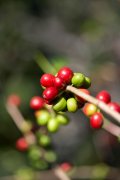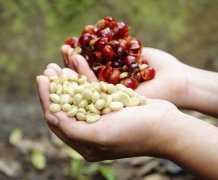The export of Ethiopian coffee knows the main producing areas of Ethiopian coffee.

The export of coffee
Coffee is Ethiopia's most important export cash crop and the main source of Ethiopia's foreign exchange earnings. Ethiopia's coffee exports account for about 3% of the world market, making it the eighth largest coffee exporter in the world. Coffee exports increased steadily from 58000 tons in 1990 to 110000 tons in 1995-1996 and remained at this level in the following years. The export volume exceeded 110000 tons from 2001 to 2002 and reached 127000 tons from 2002 to 2003. As the price of coffee on the international market has been declining for a decade, Ethiopia's foreign exchange earnings have been seriously affected. Before the sharp drop in coffee prices, coffee exports accounted for more than half of Ethiopia's foreign exchange earnings, but now they account for only about 35 per cent. But according to the International Coffee Organization, coffee prices rebounded in 2002, rising from 41 cents per pound in September 2001 to 52 cents per pound in 2002 and 59.7 cents per pound in 2003. The average price in March 2004 was 60.8 cents per pound, an increase of 50% over September 2001. This is excellent news for Ethiopia.
Ethiopian people are addicted to coffee. In 2003, domestic consumption accounted for 42.3% of the total output, with a per capita consumption of 3 kg. But more than half of the coffee produced each year is used for export to earn foreign exchange. The main exporters include the United States, Italy, the United Kingdom, Sweden, Norway, Greece, France, Belgium, Germany and Australia.
Before 1974, the right to produce, process and trade coffee was in private hands. During the military administration, private farms were nationalized and smallholder coffee producers were snubbed. In 1991, the Ethiopian Transitional Government issued a new economic policy to encourage private businessmen to export coffee. As a result, the number of private coffee exporters has increased sharply. Nearly 90% of coffee exports are now in the hands of private exporters.
The characteristics of Ethiopian coffee
The natural characteristics of coffee beans include size, shape, acidity, texture, taste and aroma. Essel's coffee beans are small, fragrant and sour like wine, and are loved by coffee lovers. Because of its unique aroma and taste, Ethiopian coffee is often used in the production and variety improvement of beverages, ice cream and candies.
The world-famous Ethiopian coffee is mainly:
1. Limu coffee grows between 1400 meters and 2000 meters above sea level. Wash the coffee. Excellent quality, with strong nut aromas, suitable acidity, with the intensity of wine. The annual output is 29000 tons.
2. Jima Coffee grows between 1400 and 1800 meters above sea level. Sun-baked coffee. Slightly sour, with nutty aromas and a long finish. The annual output is 70000 tons.
3. Gambi coffee grows between 1500 meters and 2300 meters above sea level. It is gourmet coffee with moderate acidity and fruity aroma. The annual output is 34000 tons.
4. Yerqin coffee grows from 1500 meters to 2200 meters above sea level. Mocha flavor, with floral and spicy aromas. The average annual output is about 28000 tons.
5. Sidamo Coffee grows at an altitude of 1400-2200 meters. Suitable acidity and high quality. The average annual output is about 37000 tons.
6. Harald Coffee grows on highlands above 2700 meters above sea level. It is the best coffee in the world, medium acidity, intoxicating exotic flavor, with slightly tipsy, dried fruit aroma, is pure mocha coffee. The average annual output is about 26000 tons.
Information related to the coffee trade
Official institutions:
Ministry of Trade and Industry (Ministry of Trade & Industry)
P.O.BOX 704
FAX: 00251-1-515411
TEL: 00251-1-518025
E-mail: moti@telecom.net.et
Coffee and Tea Bureau (Coffee & Tea Authority)
P.O.BOX 3222
FAX: 00251-1-517293
TEL:00251-1-518088
E-mail: etcoftea@telecom.net.et
Coffee research institute
Jima Agricultural Research Center (Jimma Agricultural Research Center)
P.O.BOX 192 JIMMA
TEL: 00251-7-110367
FAX: 00251-7-111999
E-mail: jare@telecom.net.et
Coffee association
Ethiopian Coffee exporters Association
(Ethiopian Coffee Exporters Association)
P.O.BOX 8808, ADDIS ABABA
FAX: 00251-1-711477
TEL: 00251-1-355378
E-mail: ecea@telecom.net.et
Oromo Coffee Growers Cooperative
(Oromiya Coffee Farmers Cooperative Union)
P.O.BOX 1394 CODE 1100
FAX: 00251-1-506116
TEL: 00251-1-506114
E-mail: cofunion@telecom.net.et
Sidamo Coffee Growers Cooperative
(Sidama Coffee Farmers Cooperative Union)
P.O.BOX 122067
FAX: 00251-1-527552
TEL: 00251-1-525363
E-mail: sidacoop@telecom.net.et
Yeerqifa Coffee Growers' Cooperative
(Yirgachefe Coffee Farmers Cooperative Union)
P.O.BOX 122641
FAX: 00251-1-402533
TEL: 00251-1-431774
E-mail: yirgachefe@telecom.net.et
Coffee enterprise
Coffee planting and development co.
(Coffee Plantation Development Enterprise)
P.O.BOX 4363
FAX: 00251-1-711097
TEL: 00251-1-710134
Ethiopian coffee and tea growing and marketing co.
(Ethio Coffee & Tea Plantation & Marketing Plc.)
P.O.BOX 1006
FAX: 00251-1-627764
TEL: 00251-1-615608
E-mail: ethio.coffee@telecom.net.et
Coffee processing and warehousing company
(Coffee Processing & Warehouse Enterprise)
P.O.BOX 12653
FAX: 00251-1-403722
TEL: 00251-1-431860
Coffee Technology Development and Engineering Company
(Coffee Technology Development & Engineering Enterprise)
P.O.BOX 5898
FAX: 00251-1-533668
TEL: 00251-1-155920
(source: business Office of the Embassy in Ethiopia)
Important Notice :
前街咖啡 FrontStreet Coffee has moved to new addredd:
FrontStreet Coffee Address: 315,Donghua East Road,GuangZhou
Tel:020 38364473
- Prev

Ethiopian coffee producing area introduces fine coffee Yega Xuefei and Sidamo water washing and sun treatment.
Ethiopia is one of the major producers of Arabica coffee in Africa, producing the best Arabica coffee in the world. It is said that coffee was first discovered by shepherds in Essekafa, and the name of coffee evolved from Kafa, so Ethiopia is still coffee. Ethiopia is an African Arab coffee.
- Next

Boutique coffee Guatemala Vivetnam fruit producing area coffee ripe beans Guatemalan coffee origin
Guatemala, which is famous for its highland topography, has a unique flavor of high-altitude hard beans that perform well in all-inclusive coffee producing areas and produce high-quality coffee with eye-catching performance. Guatemalan coffee has rich flavor changes and strong acidity, and sometimes can feel some changes in spices, from medium to full consistency, high complexity, is the best representative of complex style.
Related
- Does Rose Summer choose Blue, Green or Red? Detailed explanation of Rose Summer Coffee plots and Classification in Panamanian Jade Manor
- What is the difference between the origin, producing area, processing plant, cooperative and manor of coffee beans?
- How fine does the espresso powder fit? how to grind the espresso?
- Sca coffee roasting degree color card coffee roasting degree 8 roasting color values what do you mean?
- The practice of lattes: how to make lattes at home
- Introduction to Indonesian Fine Coffee beans-- Java Coffee producing area of Indonesian Arabica Coffee
- How much will the flavor of light and medium roasted rose summer be expressed? What baking level is rose summer suitable for?
- Introduction to the characteristics of washing, sun-drying or wet-planing coffee commonly used in Mantenin, Indonesia
- Price characteristics of Arabica Coffee Bean Starbucks introduction to Manning Coffee Bean Taste producing area Variety Manor
- What is the authentic Yega flavor? What are the flavor characteristics of the really excellent Yejasuffi coffee beans?

